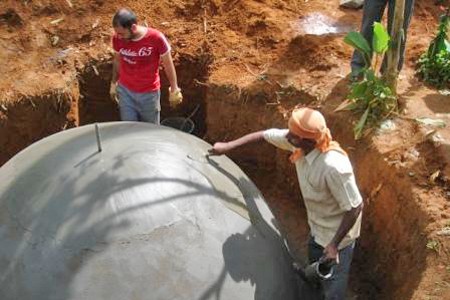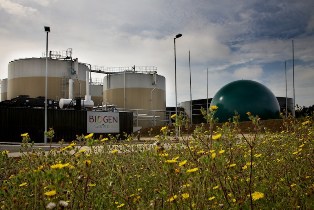Recycling minister Lord Henley today confirmed details of a 10 million Anaerobic Digestion Loan Fund (ADLF) for new AD plants in a speech to the conference at UK AD & Biogas 2011, being held in Birmingham.
But, the announcement met with a strong response from the Anaerobic Digestion and Biogas Association which accused ministers of failing to direct councils in the direction of AD.
The Fund will be administered by WRAP – the Waste & Resources Action Programme – and will lend amounts ranging from 50,000 to 1 million to support the development of new AD capacity in England in conjunction with investment from the private sector. It aims to support 300,000 tonnes of annual capacity to divert food waste from landfill by 2015.
Delegates to the conference and exhibition, which is organised by the Anaerobic Digestion and Biogas Association (ADBA), were broadly positive about the funds. But, some had reservations, especially in terms of finance and local authority commitment.
In his opening speech on Wednesday (July 6) to the conference, Lord Redesdale, chairman of ADBA, had highlighted the importance of securing feedstock.
Responding today to Lord Henleys announcement, ADBA chief executive Charlotte Morton said: This fund is welcome news for the industry, and will support projects which will make a real difference in starting to build up the UKs anaerobic digestion capacity.
Barrier
However, it represents only a small part of the investment which is needed to take AD to the point where it is really delivering for the UKs strategic objectives and raising finance remains the biggest barrier for projects.
Meeting the UKs 2020 commitments on landfill diversion and renewable energy require high investment in new capacity over the next few years. That simply isnt happening while investors are being put off by mixed messages from government, and while they remain unwilling to direct local authorities to take a course they have already said realises the most benefit.
She added: The Government needs to build on this announcement by grasping the nettle to encourage wider private finance into the market. This doesnt require more money from the taxpayer simply clear statements that organic waste feedstock should be source segregated and prioritised for AD.
Viability
Two delegates from the financial sector told letsrecycle.com that, despite the grant, there would still be concerns about the viability of AD plants taking in waste from the household stream.
One said: Projects dealing with farm waste and commercial waste have a more secure feedstock. There are a lot of uncertainties in dealing with waste and even more when comparisons are made to investing in other renewable energy projects, such as wind power.
Another added: Some people in the AD sector seem to expect banks just to jump in and take a risk which we just cant do.
And, delegates to the conference also heard a warning from a top local government officer about the uncertainties that currently exist among local authorities.
Thenote of caution came fromJulia Barrett, chair of the environment committee of the Association of Directors of Environment, Planning and Transport (ADEPT).
Speaking during a sessionon tenders, Ms Barrett, who is also director of environment and regulation for Cambridgeshire county council, said the private sector would need to be cautious in its dealings with local authorities. This government only has a limited life and local authorities will be nervous about a new government coming in. Plus there is a constant churn in local authorities with local councillors being elected.
Ms Barrett also warned of large budget pressures on councils. She said: Waste management is big business for local authorities. It is the third biggest budget and the challenge for local government is that while costs are going up, the money available to deal with waste is going down.
Related links:
She added that proponents of AD would have to satisfy local authorities on points such as whether there was a heat sink for the plant and an outlet for the digestate. And, Ms Barrett said that the relationship between contractor and the council is crucial.
However, she warned: Members have the perception that the private sector is there to rip them off. You need to build relationships, dont just send your bid team in. You need trust, respect and openness these are hard won and easily lost.

The charity Raleigh International and ADBA are to work together to increase awareness about the benefits of anaerobic digestion in the developing world. The partnership was launched last night at the associations conference dinner. Stacey Adams, Raleighs CEO, commented: We are delighted to be working in partnership with ADBA. They bring a wealth of knowledge and experience that will help us to expand on our existing biogas projects. It is expected that managers and workers in the UK involved with AD projects may spend a month abroad helping on community AD schemes in countries such as India.”











Subscribe for free